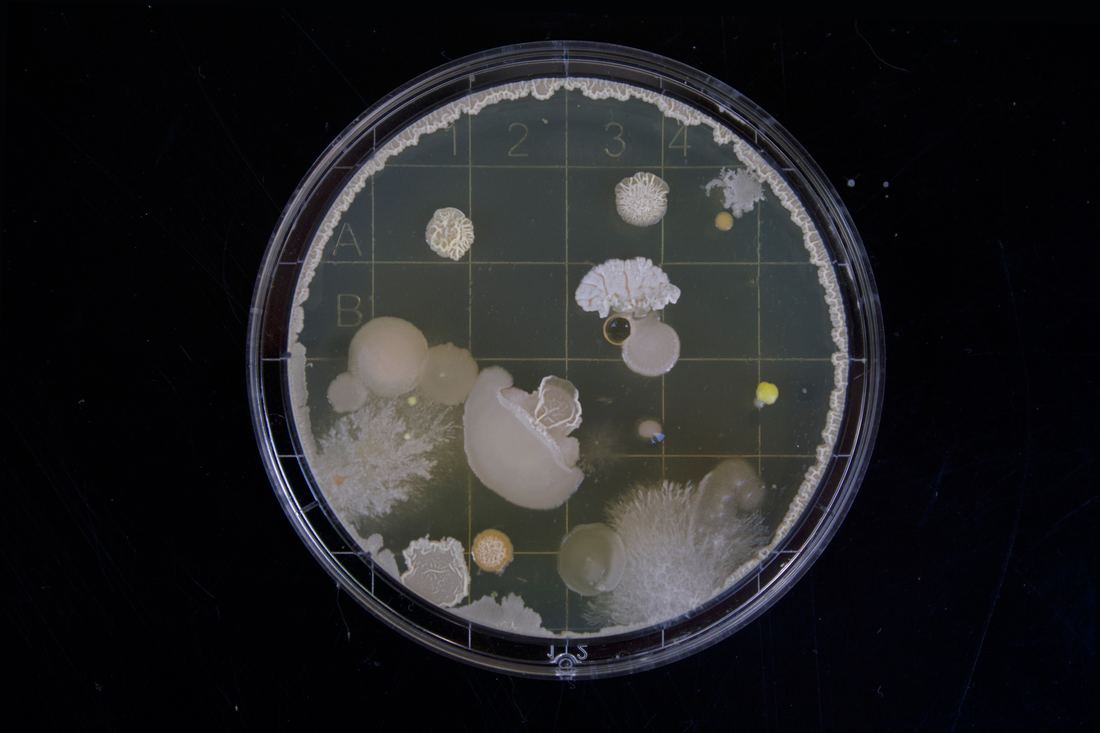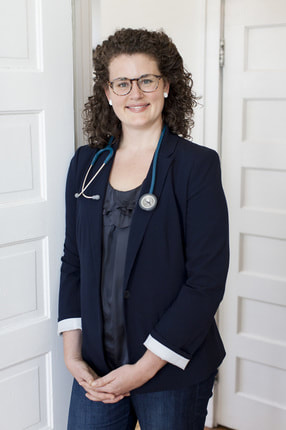We have trillions of microorganisms (bacteria, viri, parasites) living in our intestinal tract. This is called the microbiome or gut microbiota. Your microbiome starts to develop the moment you are born and complete colonization occurs within the first three years of life. Factors such as mode of delivery, antibiotic exposure, and feeding patterns determine the health of your particular microbiome. The microbiome is constantly in flux the rest of our lives. What we are exposed to, how we eat, our stress levels and more all influence our microbiome. For example, exposure to furry pets in infancy and young childhood reduces the risk of atopy (allergies, eczema and asthma) and being overweight by increasing levels of certain organisms. It is even more beneficial if you grow up on a farm! Starting at birth, our microbiome helps train the developing immune system. The commensal (good) microbes can directly attack the disease causing microbes signaling to the human immune system when to launch an attack. This training also includes teaching the immune system to ignore harmless stimuli (such as pollen or even self tissue). Without this critical training we are more at risk for conditions such as autoimmune disease and allergies. When our gut microbiome is in a stable, harmonious place this is called ‘symbiotic’. When our microbiome is unstable or out of balance it is called ‘dysbiotic’. We are finding that a dysbiotic flora or dysbiosis is a factor in many conditions. Our microbiome plays a significant role in many aspects of our health ranging from the obvious gastrointestinal conditions such as IBS, constipation, diarrhea, and inflammatory bowel disease to the less obvious such as psychological resilience, mental health, autoimmune disease, allergies and much more.
We know what we eat significantly impacts the health of our bodies and it also significantly impacts our microbiome. For example, one study found that switching from a low fat, plant polysaccharide rich diet to a high fat, high sugar (standard American diet) shifted the entire microbiome in one day. One day! The majority of our microbiome lives in our large intestine and they feed off of the food we eat. At the end of this article I list out some ways to feed your beneficial flora.
Last year a comprehensive review of recent research in the microbiome-gut-brain axis revealed that the vagus nerve plays an important role in the communication between the gut and brain. The exciting part is that the information is bidirectional. That’s right, your ‘gut instinct’ is now backed by science. They have even gone as far as looking at the microbiota of people who stay calm during stressful events and found they share common microbiome traits. So there might be a correlation between resilience and your microbiome. Are you getting a sense of just how important the microbiome is to your health? Data published in March of this year shows that social stressors can change the microbiome in hamsters and that the bacteria present in the GI tract prior to social interactions predicted outcomes of those interactions. The hamsters that ‘won’ in the social interactions had similar microbiomes. Pretty incredible.
What do we do with all of this information? Don’t run out and spend a lot of money on one of these new stool tests that will tell you all about your microbiome. They are interesting but not very clinically useful, yet. I am excited about the possibilities for medicine as we continue to learn more. Predicting health based on your microbiome and altering it to improve your health is very exciting. For now, consider how your eating habits and vagal nerve health can positively influence your microbiome.
Take home tips:
As mentioned above the vagus nerve is an important connection between the gut microbiome and the brain. Healthy vagal tone is indicated by a slight increase in heart rate when you inhale and a slight decrease in heart rate when you exhale. You can increase your vagal tone with any of the following activities:
You can keep your microbiome healthy by:
Resources:
Yang, Irene, Elizabeth J. Corwin, Patricia A. Brennan, Sheila Jordan, Jordan R. Murphy, and Anne Dunlop. “The Infant Microbiome: Implications for Infant Health and Neurocognitive Development.” Nursing Research 65, no. 1 (2016): 76–88.
Tun, Hein M., Theodore Konya, Tim K. Takaro, Jeffrey R. Brook, Radha Chari, Catherine J. Field, David S. Guttman, et al. “Exposure to Household Furry Pets Influences the Gut Microbiota of Infants at 3–4 Months Following Various Birth Scenarios.” Microbiome 5, no. 1 (April 6, 2017): 40.
Turnbaugh, Peter J., Vanessa K. Ridaura, Jeremiah J. Faith, Federico E. Rey, Rob Knight, and Jeffrey I. Gordon. “The Effect of Diet on the Human Gut Microbiome: A Metagenomic Analysis in Humanized Gnotobiotic Mice.” Science Translational Medicine 1, no. 6 (November 11, 2009): 6ra14.
Lima-Ojeda, Juan M., Rainer Rupprecht, and Thomas C. Baghai. “‘I Am I and My Bacterial Circumstances’: Linking Gut Microbiome, Neurodevelopment, and Depression.” Frontiers in Psychiatry 8 (2017).
Georgia State University. "Social stress leads to changes in gut bacteria." ScienceDaily. ScienceDaily, 8 March 2018.
We know what we eat significantly impacts the health of our bodies and it also significantly impacts our microbiome. For example, one study found that switching from a low fat, plant polysaccharide rich diet to a high fat, high sugar (standard American diet) shifted the entire microbiome in one day. One day! The majority of our microbiome lives in our large intestine and they feed off of the food we eat. At the end of this article I list out some ways to feed your beneficial flora.
Last year a comprehensive review of recent research in the microbiome-gut-brain axis revealed that the vagus nerve plays an important role in the communication between the gut and brain. The exciting part is that the information is bidirectional. That’s right, your ‘gut instinct’ is now backed by science. They have even gone as far as looking at the microbiota of people who stay calm during stressful events and found they share common microbiome traits. So there might be a correlation between resilience and your microbiome. Are you getting a sense of just how important the microbiome is to your health? Data published in March of this year shows that social stressors can change the microbiome in hamsters and that the bacteria present in the GI tract prior to social interactions predicted outcomes of those interactions. The hamsters that ‘won’ in the social interactions had similar microbiomes. Pretty incredible.
What do we do with all of this information? Don’t run out and spend a lot of money on one of these new stool tests that will tell you all about your microbiome. They are interesting but not very clinically useful, yet. I am excited about the possibilities for medicine as we continue to learn more. Predicting health based on your microbiome and altering it to improve your health is very exciting. For now, consider how your eating habits and vagal nerve health can positively influence your microbiome.
Take home tips:
As mentioned above the vagus nerve is an important connection between the gut microbiome and the brain. Healthy vagal tone is indicated by a slight increase in heart rate when you inhale and a slight decrease in heart rate when you exhale. You can increase your vagal tone with any of the following activities:
- Deep diaphragmatic breathing with a slightly longer exhale
- Loving kindness meditation
- Singing, especially singling loudly enough to us the muscles in the back of your throat.
- Gargling at least once daily, loudly to use the muscles in the back of your throat.
- Laughter- the deep belly shaking eye watering laughter.
You can keep your microbiome healthy by:
- Consuming fiber daily from a variety of sources. It is an important food source for your microbiome. Most patients in my practice are not consuming enough fiber in their diets. I recommend around 30-35g daily on average but that changes depending on the individual.
- Minimizing processed and high sugar foods in your diet.
- Consuming fermented foods
- Avoiding excessive use of antibiotics.
Resources:
Yang, Irene, Elizabeth J. Corwin, Patricia A. Brennan, Sheila Jordan, Jordan R. Murphy, and Anne Dunlop. “The Infant Microbiome: Implications for Infant Health and Neurocognitive Development.” Nursing Research 65, no. 1 (2016): 76–88.
Tun, Hein M., Theodore Konya, Tim K. Takaro, Jeffrey R. Brook, Radha Chari, Catherine J. Field, David S. Guttman, et al. “Exposure to Household Furry Pets Influences the Gut Microbiota of Infants at 3–4 Months Following Various Birth Scenarios.” Microbiome 5, no. 1 (April 6, 2017): 40.
Turnbaugh, Peter J., Vanessa K. Ridaura, Jeremiah J. Faith, Federico E. Rey, Rob Knight, and Jeffrey I. Gordon. “The Effect of Diet on the Human Gut Microbiome: A Metagenomic Analysis in Humanized Gnotobiotic Mice.” Science Translational Medicine 1, no. 6 (November 11, 2009): 6ra14.
Lima-Ojeda, Juan M., Rainer Rupprecht, and Thomas C. Baghai. “‘I Am I and My Bacterial Circumstances’: Linking Gut Microbiome, Neurodevelopment, and Depression.” Frontiers in Psychiatry 8 (2017).
Georgia State University. "Social stress leads to changes in gut bacteria." ScienceDaily. ScienceDaily, 8 March 2018.
| Dr. Barrett believes that effective healthcare is a collaborative partnership between the patient and the provider. She wants to break down the hierarchy that often exists in healthcare systems. She strives to build strong relations with my patients and inspire them to make lasting changes in their health. Dr.Barrett's goal is to dig into the root cause of your conditions and help initiate whole body healing. She is an avid student of holistic healthcare and constantly brings new information into my practice. No two people are the same, and she creates personalized treatment plans that reflect her patients unique health care needs. Dr. Barrett has been in practice since 2012. Learn more about Dr. Barrett by visiting her professional website. |



 RSS Feed
RSS Feed